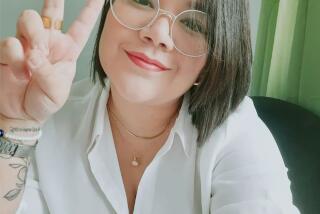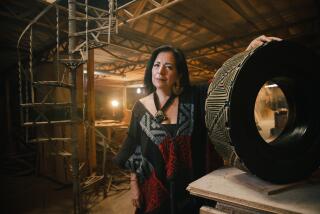Q&A: Dissident artist Tania Bruguera talks leaving Cuba: ‘I would not let them make me a paranoiac’
- Share via
For months, the case of Tania Bruguera has been a protracted drama that has played itself out on the international stage. The artist — a Cuban national — was detained in Cuba just prior to the New Year, for attempting to stage a performance about freedom of expression in Havana’s Revolution Square. And while she was soon released, Bruguera had her passport confiscated, and was later detained on various other occasions. All of this was happening during a historic political moment — when the U.S. and Cuba were coming to a rapprochement.
Bruguera, who works primarily in the U.S. and Europe, is now back in the U.S. She landed in New York last Friday, after getting on a flight without previously alerting friends or family. Her return puts an end (for now) to an eight-month-long political and artistic drama that, for a time, appeared as if it might go on indefinitely.
The artist is currently in New Haven, Conn., participating in the Yale World Fellows program, where she will be working on a new project (yet to be determined) and participating in various activities at the university.
She took time to chat via Skype on Wednesday to discuss her whole Cuba experience. (“I am still digesting everything,” she said.) In our conversation, which has been edited for flow, the artist said she would return to Cuba. But first, there are a number of projects that will keep her in the U.S. for the time being — including one that will bring her to L.A. and the California Institute of the Arts.
You left Cuba very quietly. In fact, I understand that you only let friends and family know you were leaving once you were in the air. Why the secrecy?
I have been surveilled for eight months. At one point, I thought, “No, I’m being paranoid. Of course they don’t care about me anymore.” But in the meanwhile I suspected that someone very close to me was one of the informers. So I didn’t tell anybody that I was leaving. I did tell that person the night before. And then in the morning I did normal stuff, like I’m not leaving. I go to the house. I go here. I go there. And immediately in the morning, I have five people — friend and friends of friends — calling me saying, “When are you leaving?”
And I arrive at the airport and [a pair of Cuban state security officials], Javier and Andrea, arrive — literally, 10 minutes after I get to the airport. They couldn’t do anything because I was leaving. But [one of the officials] asks me what happened with this conference in Puerto Rico. It was this conference of dissidents. He says, “What did you hear?” I said, I didn’t know because I didn’t go.
He said to me, “Can you give me your number in the United States?” I said, “Thanks to you I don’t have a phone anymore because I lost my line.” And he said, “Can I have your address?” And I said, “Well, I lost my apartment too” -- my apartment in Corona, Queens [in New York]. He said, “I might be there in September.”
It’s like until the last minute they want to mess with your head. They want to make you paranoid. At one point he said, “Someone close to you works for us.” I said, “You’re not going to make me a paranoiac. I’ve been here for eight months and I am not a paranoiac.” I understood they were watching me. But I would not let them make me a paranoiac. That’s what they do, they make you paranoid, they isolate you.
What did it feel like as your flight took off for New York last Friday?
The first thing I was like, there’s Internet! Free Internet. That really was almost a shock. It was very intense not to be able to communicate freely with anybody you trust. I made drawings of where all the public telephones were located. (While I was in Cuba, I started drawing again.) You could use a public phone, but only once, because then they would be monitoring. Or you’d have someone stand right next to you and they would [be listening in]. So I drew where all the phones were and which ones I used.
At one point, you said that you would not leave Cuba until you had a written guarantee from the government that they would let you back into the country. Were you able to get such a confirmation?
I didn’t get exactly what I asked for. But I did get a letter that says that they’ve closed the case. The lawyer I worked with said it was the first time they’d seen something like this. The thing is that [state security does] things and then there is no record. They ask you to sign papers, two copies of papers and then they keep both copies. You have nothing. So this is extremely good.
I also had my things returned. Everyone is very impressed they gave me my computer back. I’m going to use it as an artwork now. The one thing I learned is that [the Cuban government] gave a different meaning to my work. That’s fine. My work is about that. Setting the scene and seeing what happens. The government was the one who wanted to participate. I was fighting for the authorship of my piece with the government! [Laughs.]
Was there a moment where you were fearful that something really bad could happen? That you could end up in jail for the long term? Or that there could be a crackdown?
It was the moment when I was first detained in my house. That was the 30th of December. They wouldn’t let me leave the house. All the phones were cut. The cellphone was cut. My family, I was very worried about them. They’re old people. The most stressful moment was to know that I could do nothing to prevent an outburst of violence on Revolution Square. I had told everyone, “Don’t do anything until I get there.” Before the performance started, I wanted to make sure we read the rules, that everyone understood them.
It was also stressful the night before [the intended performance]. Some friend, they told me, “Don’t go home.” I thought, I could walk all the night around Havana and not go anywhere. Or I could sleep on the street like a homeless person. But by then they were following me. And then I realized that it was very important to show that I was not doing anything wrong, so why would I have to hide?
There is no legal avenue in Cuba for this. There is no law in Cuba where a single citizen can ask permission to use the street to do anything — whether it’s a fair or a stand with a business. It always comes from top to bottom.
At what point did you realize that the government likely wouldn’t prosecute you?
It was like the 10th of July. After six months — 180 working days — it was obligatory for them to request a special permit from the Minister of the Interior to continue the investigation or they would have to charge me with something. So I knew that at 180 days something would have to change. I would go to prison or be liberated. That was the turning point.
Then they gave me the passport. They told me that the case was closed, and to sign here. And as I’m standing there with the paper, they said, “Don’t get any ideas about putting a microphone in a plaza again or I will open the case again and we’ll put you in prison.”
The one thing that changed while I was there is, now I have a mission. I want freedom of speech in Cuba. I entered Cuba as an artist but left Cuba as an activist. I was always both. But I was more an artist. But now I’ll be focused on activism. There is a lot of work to be done
What are you going to do next?
One thing I’m going to do is to take this horrible energy and transform it into something good. So I will continue do the Hannah Arendt Institute for Artivism [started as part of a performance in Havana, in which Bruguera read from Arendt’s “The Origins of Totalitarianism”]. It will be about civic education. It will be for people on the street. To show them the value of their behavior, the power they have. That’s not going to be an easy task. It’s going to be a very big project.
The second thing I want to do is an art video. A very good friend of mine gave me this gift which is 10 sessions with this therapist who specializes in Stockholm syndrome. So we will record the sessions and I will turn into a video.
Right now I’m at Yale, and I’m also going to be working with the mayor of New York [as the artist in residence] at the [Office of Immigrant Affairs]. And I will be in L.A. at some point to do something at CalArts [as part of the Herb Alpert Award, which she received in May]. I’ll be there a week or 10 days. The [Herb Alpert Foundation] has been really wonderful.
Really, I am so grateful to all of the people who supported me in this. My sister, Deborah [Bruguera], she barely slept for eight months. And so many other people, I am so thankful.
Do you have plans to return to Cuba?
It was very hard, but I don’t regret anything. It was important that art had a function at a historical moment in Cuba. To be a part of society, to be a part of that, it was incredible. And now people in the street in Cuba know what performance art is. Every day people would be talking about “el performance.” It was incredible.
But I will return to Cuba to do the Institute. I will definitely go back.
Find me on Twitter @cmonstah.
More to Read
The biggest entertainment stories
Get our big stories about Hollywood, film, television, music, arts, culture and more right in your inbox as soon as they publish.
You may occasionally receive promotional content from the Los Angeles Times.











